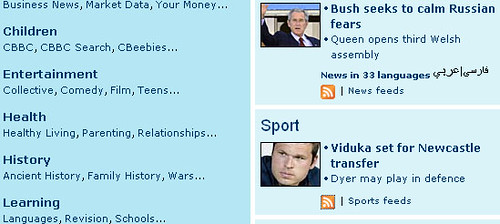Now not everyone will agree with my observation, and say that it is the responsibility of browser developers to cater for this need, but I know for a fact that if there is no guidance on this area of accessibility then lots of people are going to lose out.
Now you see it, Now you don't
Back in January, I wrote about the importance of link highlighting, a simple feature that takes seconds to implement, requires little or no design skill and just an ounce of development skill.Now while I wholeheartedly agree that it is the responsibility of the user agent to provide the highlighting mechanism for links and form controls (something customisable would be ideal), the current default mechanism (a feint dotted outline) can be very difficult to see and will require some time to track down. I know this because I have sat next to people that have completely lost track of where the focus area is and have resorted to trying to make sense out of the link information in the status bar, sometimes with no success. Once the focus is lost, it can be very hard to find it again, even with copious amounts of tabbing.

(This example from the BBC homepage is the best I can come up with at short notice, I'll replace it as soon as I get something better and that doesn't incriminate one of my clients. But How long does it take to you to figure out where the focus is?)
Was WCAG 1.0 more user-centred?
WCAG 1.0 provided some checkpoints that, let's face it, are pretty useless now, but at the time probably saved the sanity of thousands of web users, Checkpoint 10.4 for instance tells us to populate our form fields with some content. It seems like an odd requirement now, but it was critical for many disabled web users back in 1999 when early screen readers would ignore form fields if they did not have something in them, (or so I am told). WCAG 2.0 currently seems to assume that user agents (browsers and assistive technologies) need no further improvement, or at least that developers shouldn't worry about their known shortcomings.I don't want to go into this area of debate about whether developers should make up for browser inadequacy really. You'll need to form your own opinion on that. What I do know is that a simple fix can transform the experience for many users. I also know that a soft approach by WAI in the past (Until user agents...) has resulted in a better standard of browsing for many disabled web users.
Maybe the same soft approach would do the same to help many more people now. Isn't that what WAI is about?

2 comments:
Do you need help to summarize text online? If so, you have come to the right post as here are some tips when summarizing as well as some good tools to use when you are working with summaries. There are many tools online to help you with that, and some of them can be used as an open source summarizer. To discuss this further, check out below.
Learn more about: text summarizing tools
場的2~3成)。一般午場的時段為何? 下午3~9或4~10或禮服店5~11(最少要上6小時)註: 必須把最後一桌坐完(例如客人7點進場消費到10點半 妳要坐到該客人離場,不能中途卡檯) 若堅持9點離開公司,則有些店家於7~8點左右就不會安排妳看檯(對收入酒店工作的好處有很大影響) 門禁:有些店家或客人,會接受公關於9點不論理由可止檯、且直接下班。 許多公關彈性選擇「午場跨晚場」加班(一星期加班晚場2~3天,該桌結束後,可隨時下班),好增加節數。14.租套房在店家附近,還是通勤呢?!在北部以妳住基隆或桃園,想在台北酒店工作為例:為了適應新環境,先通勤試上幾天後,再決定下一步。先別急著找房子,初期兩 ~三週先通車,先有收入,不適應馬上換店。確定好店家後,短期不會換店,再從周邊開始找房。台北精華區小套房,有管理員且環境尚可,月租落在2.2萬左右,首月房租+2個月押金,需要6.6萬。店家每月定期開會(晚上7點左右),不定期舉辦活動(提早作造型準備)。租屋雖然比基隆、桃園貴一點,但扣除交通費其實是差不多。加上我們日夜顛倒與喝酒,所以更須要睡眠。結論:先通勤再租屋。15.為什麼許多人會選擇經紀公司!! 『演藝圈經紀人 : 規劃演藝人員各式各樣酒店工作的好處的演藝事業,能成就其發光發熱!』『酒店業經紀人 : 規劃酒店姐妹在安全有尊嚴的環境中,賺到錢進而改善生活!』目前市場上有眾多經紀人,但素質良莠不齊,負面消息不斷,以下是經紀公司應有的條件: 有能見度與知名度。 有五年以上的酒店經紀經驗。 和各店家保持良好互動關係。 旗下經紀人,必須不開桌消費、不賭博、不碰危禁品。 24小時輪班待命,酒店經紀人需要隨時處理各式突發狀況和臨場反映。 網路世代,起碼要有像樣的官方網站,並非只有免費的部落格與臉書。經紀公司能幫妳處理的事情包括: 挑選適合的店家類型(禮服店、制服店、便服店、鋼琴酒吧..等) 洽談適當的上班時段(一天工作幾小時?一個禮拜工作幾天?午場或晚場?) 上班時所需造型包裝(衣服?髮型?化妝?) 薪資需求及後續相關(薪資怎麼算?多少?多久領?怎麼領?如何調薪?) 上班後相關問題處理(排假?下檔?請病假?扣薪?) 其他突發狀況 (臨時休檔?無法參加開會?不習慣想換店?)重點是妳的經紀公司會不會幫妳爭取福利?!能否幫妳找到好的店家?!能不能解決問題?!酒店本是灰色地帶,來這裡討生活的人,都只有一個目標,就是解決經濟壓力或過更好的生活。16.這樣的經紀公司要注意!若有以下情況,是必須考慮換經紀人,因為已經不適任,千萬別委屈自己!和經紀人有不正常的財務牽扯。常找不到人,電話也不接 。只有領錢才出現,其他時間常搞失蹤。大小事情都自行處理,經紀人老是後知後覺,好像事不關己!節數錢有誤,常不清不楚,發薪日總比別人慢!不管男或女經紀人,常和自家姐妹搞曖昧
Post a Comment